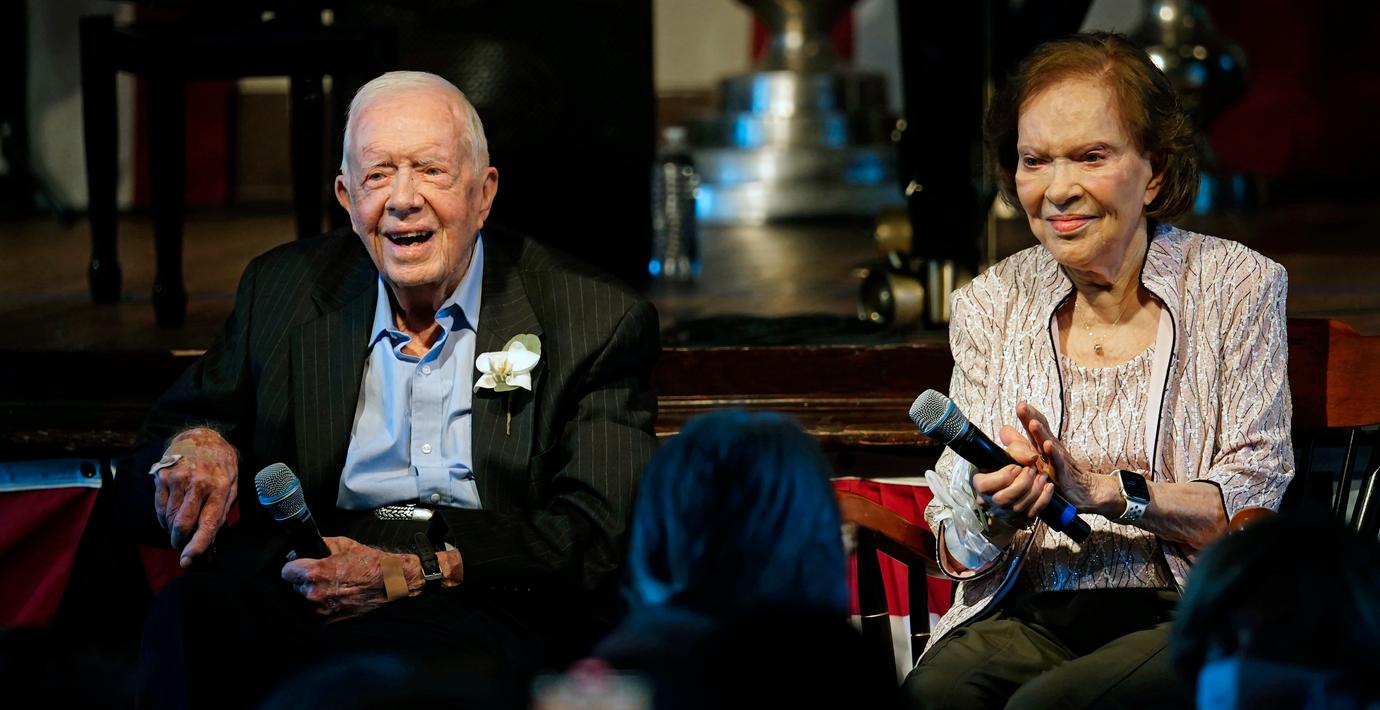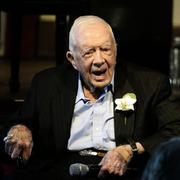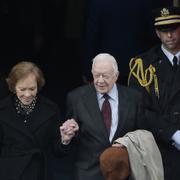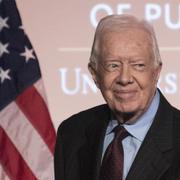
Carter fyller 99 efter sju månaders palliativ vård
USA:s mest långlivade ex-president, Jimmy Carter, firar på söndagen sin 99-årsdag. Det rapporterar AFP.
I februari troddes han ligga på sitt yttersta, och hans organisation Carter Center meddelade att han skulle vårdas palliativt i sitt hem i Georgia under ”sin sista tid” tillsammans med sin 96-åriga hustru Rosalynn.
Carter har dock trotsat oddsen, och har sedan dess fortsatt se på baseball-matcher och äta regelbundna portioner glass. Förra veckan gjorde han och hustrun ett framträdande på Plains Peanut Festival i hemstaden.
I ett inlägg på X skriver president Joe Biden om sin beundran för Carters ”otroliga integritet, starka karaktär och beslutsamhet.”
”Gud välsigne dig, grattis på födelsedagen kompis.”
bakgrund
Jimmy Carter
Wikipedia (en)
James Earl Carter Jr. (born October 1, 1924) is an American politician and humanitarian who served as the 39th president of the United States from 1977 to 1981. A member of the Democratic Party, he served as the 76th governor of Georgia from 1971 to 1975, and as a Georgia state senator from 1963 to 1967.
Carter was born and raised in Plains, Georgia; graduated from the U.S. Naval Academy in 1946; and joined the U.S. Navy's submarine service. Afterward he returned home, where he revived his family's peanut-growing business. He then manifested his opposition to racial segregation, supported the growing civil rights movement, and became an activist within the Democratic Party. He served in the Georgia State Senate from 1963 to 1967 and then as governor of Georgia from 1971 to 1975. As a dark-horse candidate not well known outside of Georgia, Carter won the Democratic nomination and narrowly defeated incumbent Republican president Gerald Ford in the 1976 U.S. presidential election.
Carter pardoned all Vietnam War draft evaders in his second day in office. He created a national energy policy that included conservation, price control, and new technology. He successfully pursued the Camp David Accords, the Panama Canal Treaties, and the second round of Strategic Arms Limitation Talks. He also confronted stagflation. His administration established the U.S. Department of Energy and the Department of Education. The end of his presidency was marked by the 1979–1981 Iran hostage crisis, the 1979 energy crisis, the Three Mile Island accident, the Nicaraguan Revolution, and the Soviet invasion of Afghanistan. In response to the invasion, Carter escalated the Cold War by ending détente, imposing a grain embargo against the Soviets, enunciating the Carter Doctrine, and leading the multinational boycott of the 1980 Summer Olympics in Moscow. He lost the 1980 presidential election in a landslide to Republican nominee Ronald Reagan.
After leaving the presidency, Carter established the Carter Center to promote and expand human rights, earning him a Nobel Peace Prize in 2002. He traveled extensively to conduct peace negotiations, monitor elections, and further the eradication of infectious diseases. He is a key figure in the nonprofit housing organization Habitat for Humanity and wrote numerous books, ranging from political memoirs to poetry, while continuing to comment on global affairs, including two books on the Israeli–Palestinian conflict, in which he criticizes Israel's treatment of Palestinians as apartheid. Polls of historians and political scientists generally rank Carter as a below-average president, although his post-presidential activities are viewed in an exceptionally positive light. Aged 99, he is both the longest-lived president and the one with the longest post-presidency. He is also the third-oldest living person to have served as a nation's leader.
Omni är politiskt obundna och oberoende. Vi strävar efter att ge fler perspektiv på nyheterna. Har du frågor eller synpunkter kring vår rapportering? Kontakta redaktionen


